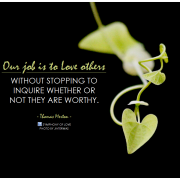Loving the enemy – a way of healing our attitudes
“Loving our enemies is the core of the Christian message and the challenge that Jesus presents us. If we want to know what Jesus is about, and what following Jesus is about, then the call to love our enemies is as close to the center as we can get.”
Henri J. M. Nouwen
Jesus left us certain instructions that are very much counterintuitive. A commandment to love our enemies is one of them. Our world seems rather polarised at the moment, we fluctuate to those we agree with. If someone asked who our friends are, we could tell them, but we could probably also tell them who are not-our-friends. Perhaps we do not call them ‘enemies’. But those we don’t agree with: we too know them by their name.
Our churches, our Facebook feeds, are filled with people we love and agree with, as well as those we disagree with. If you have struggled with loving people that you fundamentally disagree with on some core issue, you are not alone. I have too. Yet it is very clear that God calls us to love each other. Jesus said, “Love each other as I have loved you” (John 15:12). To love also those we disagree with is to have God’s attitude. It is an essential ingredient needed to transform the world into a better place. And it is possibly also one of the least exercised muscles in our Christian faith.
Bréne Brown, public speaker and research professor at the University of Huston, in her most recent book “Braving the Wilderness” says, “the choices we’re making to protect our beliefs and ourselves are leaving us disconnected, afraid, and lonely. Very few people are working on connection outside the lines drawn by ‘their side’”. Her book challenged me. While we may justify excluding or not engaging with those who hold views we disagree with, Bréne Brown says this is a dangerous approach. It leaves us more isolated, whereas we all need human connection.
Unless we constantly bring to our awareness that God loves each and every person, we will retreat in labelling and sorting each other out. We can love those that we experience as different, because God already loves them. This does not mean we will stop disagreeing on certain issues, but perhaps we can find ways of connecting beyond the disagreements. Personally I started to consciously bless individuals and groups of people that for whatever reason are not ‘my people’, and that I find difficult to love.
If we could hold sacred the connection between us, the God-given-dignity we each have, together with the views that are central to our identities, perhaps we would be able to engage with more trust, more grace and invite God to enter into the space between us that creates separation and disconnect. I’m not saying this would be easy, otherwise we’d already be doing it. But if God was allowed to fill that in-between space, we might be able to look at each other through God’s mercy and grace.
Iva Beranek
Dr Iva Beranek is the Ministry Facilitator for the CMH: Ireland


